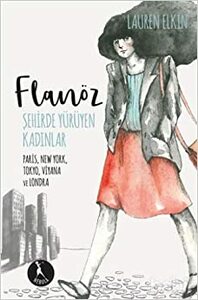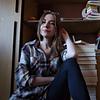Take a photo of a barcode or cover
Flanöz, bu yıl okuduğum en güzel kitaplardan biriydi. Kitabın her bir cümlesi, özenle ve binbir emekle çevrildiğini hissettiriyor. Bu anlamda çevirmen Doğacan Dilcun Doğan'ın payı asla yadsınamaz. Kitabı okurken ve bitirirken sokaklarda aylak aylak dolanmak, bir kafede saatlerce oturup insanları izlemek istedim. Ölmeden önce Japonya'ya gitme hayalim ve arzum ise kitabı okuduktan sonra daha da pekişti. Çok sevdim özetlemek gerekirse.
reflective
medium-paced
adventurous
challenging
funny
hopeful
reflective
The disperate parts (memoir, bios about famous women artists) didn't coalesce into a book about walking for me. If it was marketed as a book about moving to Paris this rating would be completely different
A mishmash that works surprisingly well together: the history of women who walk in cities (*flaneuses,* to match the male term *flaneurs*); biography of some female writers like Jean Rhys, George Sand, and Martha Gellhorn; academic discussions on the social meaning of the suburb; the history of Paris; the plot of an art film; fragments of memoir from the author, which serve to keep it from being too academic. It’s a hard line to walk, that mixing of memoir—inherently intimate—and erudition—which lends a detached air whether it means to or not; I’m honestly not sure I’ve ever found an example I’ve found wholly successful. Still, while I can’t bring myself to consider *Flaneuse* a must-read for anyone, if the topic interests you, you will almost certainly get something out of it.
What we build not only reflects but determines who we are and who we’ll be. ‘A city is an attempt at a kind of collective immortality,’ wrote Marshall Berman in an essay on urban ruin: ‘we die, but we hope our city’s forms and structures will live on’. The opposite is true in the suburbs. They have no history and don’t think about the future; very little there is built to last. Posterity is irrelevant to a civilisation living in an ongoing, never-ending present, with as much care for the future or sense of the past as a child. In his classic 1961 study *The City in History*, Lewis Mumford describes the naivety of the suburbs, which sustain in their inhabitants a ‘childish view of the world’, a false impression of security, if not an outright political apathy. Terrible things happen elsewhere, but never here, not now, not to us. It’s the most natural parental instinct to want to give your children a better childhood than your own; but the generation of city dwellers who invented the suburbs blew past ‘better’ in their pursuit of an impossible social isolation. It is as if they were trying to give not only their children but *themselves* the childhood they never had. The suburbs present the world to their children as if padded in felt, as if life were something gradually accumulated through commercial transaction, store by store. Often American literature and films about the suburbs feature children and adults losing their innocence, surprised, unprepared, for how terrible life can be: *The Virgin Suicides*, *American Beauty*, *Revolutionary Road*, *Weeds*—all of these ask not only ‘is that all there is?’ but ‘is there really that, too?’
reflective
medium-paced
reflective
slow-paced
The book meanders, unsurprisingly. I didn’t realize it would be a memoiristic set of essays inspired by the lives and essays of others. It was okay I guess
adventurous
challenging
emotional
funny
hopeful
informative
inspiring
lighthearted
reflective
medium-paced
adventurous
challenging
funny
hopeful
informative
inspiring
lighthearted
mysterious
reflective
relaxing
medium-paced
Being somewhat of a Flâneuse myself, I was looking forward to jumping into this one. It turns out that I had a mixed experience. On one hand, some of the historic information was surprisingly enjoyable. On the other, some of it was long-winded and seemingly irrelevant. Some sections really conveyed the author's experience, while others seemed to be holding back considerably. Overall, I would say that it starts off strong and generally goes downhill. However, there were enough nuggets of information and inspiration, throughout, to make me glad I read the whole thing.






